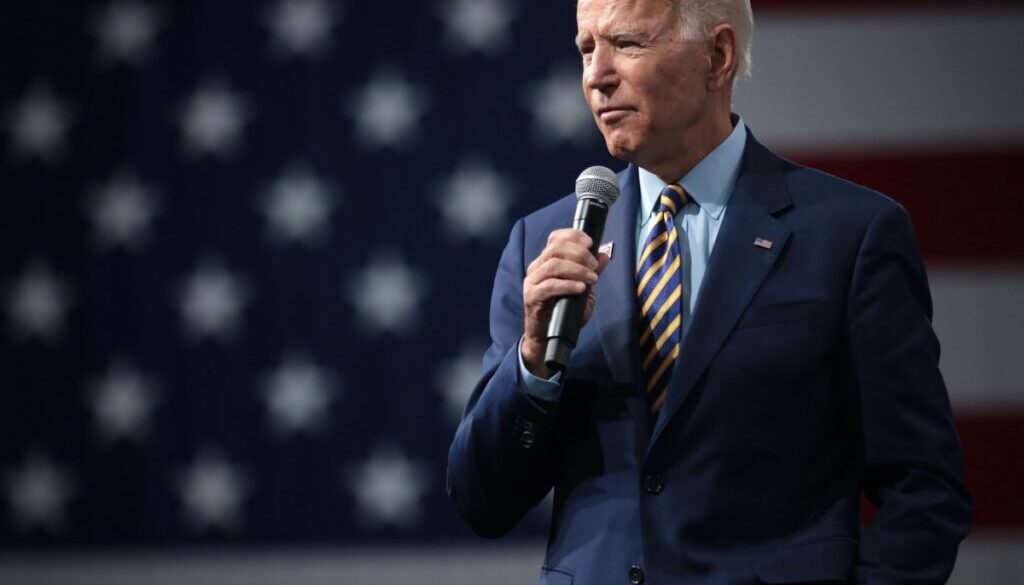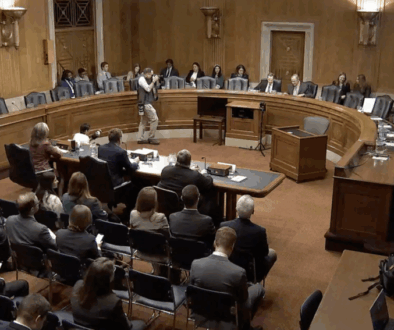Biden’s State of the Union sidesteps environment, despite ambitious agenda
President Joe Biden’s first State of the Union address largely sidestepped discussion of the climate crisis, despite the administration’s ambitious agenda that includes potential greenhouse gas rules for power plants and efforts to tackle water contamination.
Save for a few sentences, the March 1 speech to Congress was largely devoid of any in-depth mentions of energy or environmental issues. Instead, it focused heavily on healthcare, infrastructure, Russia’s invasion of Ukraine, and other topics.
Biden referenced the bipartisan infrastructure deal Congress approved last year, saying the law will help to reduce energy bills, tackled the climate catastrophe, and clean up water supplies.
The plan will “cut energy costs for families an average of $500 a year by combating climate change,” he said.
The law includes $7.5 billion to build out a U.S. network of up to 500,000 electric vehicle (EV) chargers, with the goal of encouraging greater use of EVs to cut emissions and create jobs.
It also allocates $65 billion for clean energy grid and transmission investments, aiming to make power infrastructure more resilient to the adverse impacts of the climate crisis. There’s also $50 billion for weatherization and to protect communities from drought, wildfires and floods.
The infrastructure plan also provides billions of dollars in funding to accelerate the Environmental Protection Agency’s cleanup of Superfund sites, and efforts to replace lead water lines.
“We’ll build a national network of 500,000 electric vehicle charging stations, begin to replace poisonous lead pipes – so every child – and every American – has clean water to drink at home and at school, provide affordable high-speed internet for every American – urban, suburban, rural, and tribal communities,” Biden said.
Biden also outlined proposals for improving energy efficiency and incentivizing cleaner energy.
“Let’s provide investments and tax credits to weatherize your homes and businesses to be energy efficient and you get a tax credit; double America’s clean energy production in solar, wind, and so much more; lower the price of electric vehicles, saving you another $80 a month because you’ll never have to pay at the gas pump again,” said Biden.
“And we’ll do it all to withstand the devastating effects of the climate crisis and promote environmental justice,” he said.
Although Biden’s speech largely sidestepped lengthy discussion of environmental issues, activists took note of the statements touting the bipartisan infrastructure law and the proposals for targeting the climate catastrophe.
“The president was right to tout the major victories in the bipartisan infrastructure plan on slashing energy costs for families while fighting the climate crisis and protecting the environment. Much more needs to be done, and the administration has already outlined many important steps, from tackling chemicals in our water to promoting clean energy,” said EWG President Ken Cook in a statement to The New Lede. “Just because these and other policy priorities didn’t get a mention shouldn’t be seen as a sign that crucial action isn’t happening.”
“The state of the environment is imperiled,” Natural Resources Defense Council CEO Manish Bapna said in a statement. “We can’t stand idle while rising seas, withering drought, blistering heat and raging wildfires, storms and floods inflict a widening toll on the nation and around the world. It’s time to invest in cleaner, smarter ways to power our future, cut costs for our families and create jobs.”
Thomas Pyle, president of the free-market American Energy Alliance, criticized Biden’s agenda, saying it will exacerbate reliance on foreign oil and fail to meet its renewable energy goals.
“There’s a little secret some of your aides may not be telling you, Mr. President. If you are worried about the economic and national security consequences of energy policy, you should know that a ‘green energy future’ is – at least currently – a Chinese energy future,” Pyle said in a statement. He claimed that renewable energy increases industrial costs, causing job losses.



